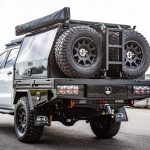Australians may never have a shortage of opinions about whether rear-wheel drive (RWD) vehicles are better than their front-wheel (FWD), but there’s no getting around the fact that of the more than 20 million cars, caravans, and utes registered in Australia, the number of four-wheel drive (4WD) vehicles in the country is the country’s fastest-growing segment.
These all-terrain, go-anywhere vehicles feature drivetrains that connect each wheel independently to its own axle shaft, and each axle shaft to two CV (constant velocity) joints. These are time-tested drivetrain configurations that are designed for optimum traction and mobility; dogged durability, however, isn’t always the main characteristic.
CV and axle sets are complex components that require more frequent maintenance than ordinary drivetrains and are significantly more prone to damage when a vehicle’s driven aggressively. What that means is if you regularly take your 4WD off-roading and haven’t already changed the factory-installed CVs and axle shafts, then you need to put an RCV Performance drivetrain upgrade on your radar.
Pushing the Envelope on Axles

RCV has specialized in manufacturing race-ready and extreme-use drivetrain parts and components for off-road use for 70 years, and they understand the importance of superior axle design better than anyone. What that means is when you upgrade your 4WD with RCV axle shafts and CVs, you’re installing components that are engineered to be tough enough to take on the Dakar Rally, but still tame enough to let you glide through Sydney like you’re riding on a cloud.
RCV manufacturers all components and internals that go into their complete axle sets, including:
- Axle shafts. Individual left- and right-hand shafts for a wide range of 4WD vehicles.
- CV assemblies. Complete inboard and outboard units with all bearing and race cage hardware.
- CV boots. Neoprene rubber covers and steel clamps keep CV joints fully lubricated.
The reality that every driver has to face whenever they subject an OE drivetrain to severe usage is that parts are going to break, and that’s why it’s so important to strengthen your axle shafts and CVs before it has a chance to happen. RCV manufactures a full range of transaxle upgrade parts to modify, convert, and strengthen OE gear hubs and drive flanges. They give you all the drivetrain parts you need to confidently push the envelope on off-road performance, knowing that your CVs and axles won’t be the weak links.
The Best Deserve RCV Axles

RCV makes axle shafts and CVs for virtually every popular Australian ute, 4WD, or 4×4, including:
- Toyota J40, 60, 80, and 105 family Landcruisers;
- Toyota HDJ and VDJ family Landcruisers;
- Toyota HiLuxes and 4Runners;
- Nissan Y60 and Y61 Patrols; and,
- Ford T6 Rangers and Mazda BT50s.
Within the ranks of off-road royalty, these are some of the most respected and durable 4WDs on the market; but in OE trim, they’re not immune to transaxle problems. And this is especially true when you consider how frequently they’re modified to make them even more off-road worthy, such as:
Increasing horsepower. Only a moderate boost in horsepower (or more appropriately, torque) can result in a sudden, unexpected axle shaft and CV failure.
Larger tyres. Larger tyres don’t just increase the weight and rolling resistance the drivetrain has to overcome, they also put a massive increase in torsional stress on your CV joints.
Suspension lifts. Raising your vehicle to add more ground clearance not only changes the suspension geometry, but can also cause CVs to bind and CV boots to wear out prematurely.
Under normal driving conditions, any of these mods would easily put more pressure on your axle shafts and CVs than they were designed for. Combine this, however, with the drive line shocks of hard landings, extreme wheel hop, and severe camber angles and you’ll be surprised how quickly OE axle shafts can be sheared off or CVs snapped.
RCV’s heavy-duty axles and components are made to withstand these kinds of compounded impacts. But high-quality axles need to begin with high-quality materials, and even 41xx high-tensile steel doesn’t have the strength to hold up under these conditions for long. Ultra-high strength steels can take the punishment though, and RCV puts them solidly to use to make sure you never have to experience a material drivetrain failure.
Tough Alloys for Tough Axles

RCV axles and drivetrain components are all made from SAE 43xx, or higher hardness steels to ensure their survivability under the most strenuous off-roading conditions. If you’re looking to bulletproof your axle shafts and CVs, these are materials you look to.
- 4340 alloy. RCV uses heat treated 4340 alloys for their gears, as well as their gear and flange sets. It’s the ideal material for the maximum strength that transaxles need to match the precision machining that guarantees a perfect fit.
- 300M alloy. Ultra strength 300M marks the pinnacle of high-performance drivetrains, and it’s the only metal RCV uses for its super-hard axle shafts and CVs. 300M won’t distort, even at high temperatures, making your axle shafts and CVs potentially the most durable components on your vehicle.
With RCV, you can rest assured that you’re driving with the highest quality and best-built drivetrain components available. They’re engineered to resist the kinds of mechanical failures that could bring your vehicle to an unfortunate standstill at potentially the worst possible time, and that’s the kind of engineering that is well worth investing in.
The Final Word
At the end of the day, if you’re an avid off-roader who’s spent any length of time on the trail, then you already know that you don’t have to go very far to push most OE components to the point of breaking. What you want to do is minimize as much of the preventable breakage as possible, and your axle shafts and CVs should be your starting point.
Upgrading your 4WD’s factory drivetrain components with strengthened RCV axle shafts and CVs will do more than just remove them from your preventable breakage list. It’s going to potentially help save your steering, suspension, and even your transaxle from damage as well. Now that’s an investment that you’ll be glad you made.


